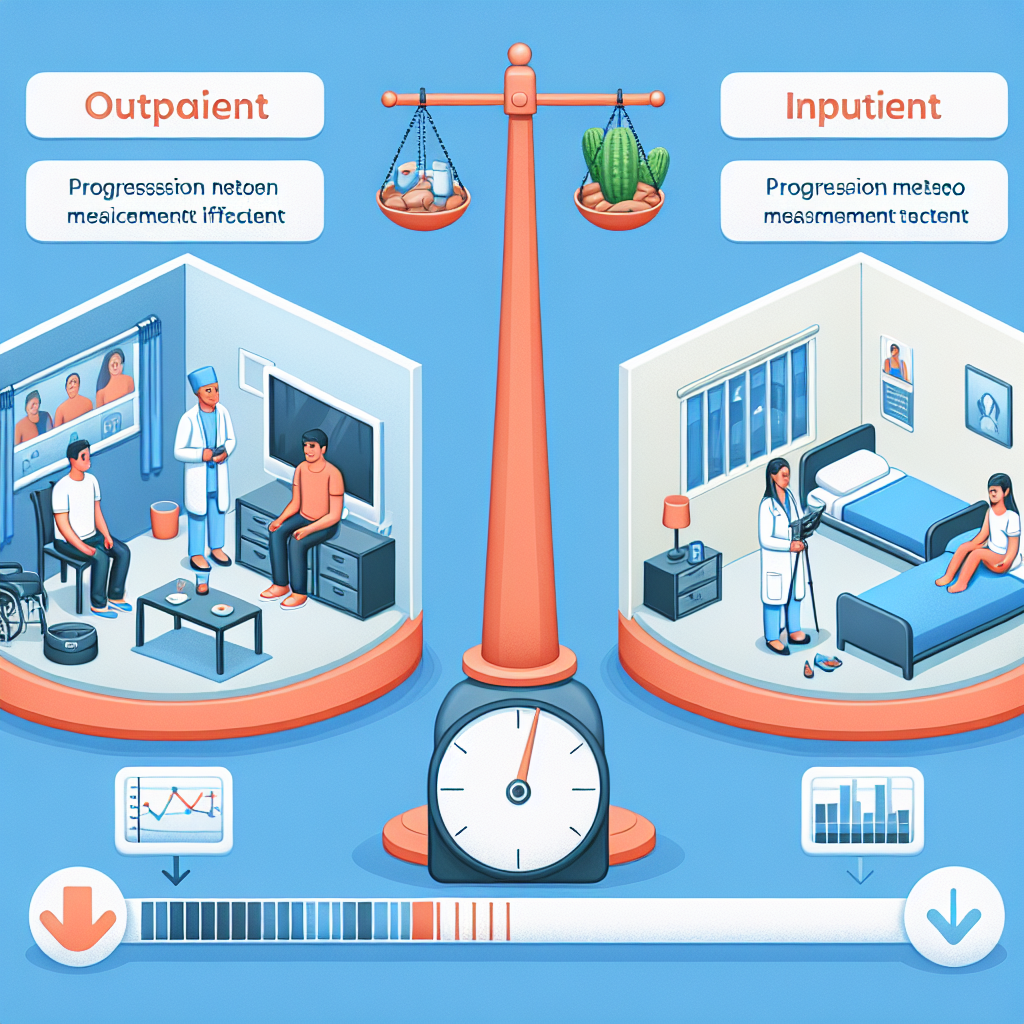-
Table of Contents

“Outpatient Treatment: Effective Recovery, Real-Life Balance.”
Introduction
Outpatient treatment for alcohol addiction recovery can be as effective as inpatient treatment, depending on various factors such as the severity of the addiction, the individual’s personal circumstances, and the quality of the treatment program. Outpatient programs offer flexibility, allowing individuals to maintain their daily responsibilities while receiving therapy and support. These programs often include counseling, group therapy, and medical support, similar to inpatient care. Research indicates that with the right level of commitment and support, outpatient treatment can lead to successful long-term recovery, making it a viable option for many individuals struggling with alcohol addiction.
Comparing Effectiveness: Outpatient vs. Inpatient Treatment for Alcohol Addiction Recovery
When it comes to alcohol addiction recovery, the choice between outpatient and inpatient treatment can be a pivotal decision. Both approaches have their unique advantages and challenges, and understanding their effectiveness is crucial for individuals seeking the best path to sobriety. Outpatient treatment, often perceived as less intensive, offers a flexible schedule that allows individuals to maintain their daily responsibilities, such as work or family commitments. This flexibility can be particularly beneficial for those who cannot afford to take extended time off from their lives. On the other hand, inpatient treatment provides a structured environment where individuals can focus solely on their recovery without the distractions and temptations of the outside world.
One of the key factors in determining the effectiveness of outpatient treatment is the level of support available. Outpatient programs often include a combination of individual therapy, group counseling, and educational sessions. These components work together to provide a comprehensive approach to recovery. The support network built through group counseling can be incredibly powerful, as individuals share their experiences and learn from one another. Additionally, outpatient treatment allows individuals to apply the skills they learn in real-time, navigating the challenges of daily life while receiving ongoing support.
In contrast, inpatient treatment offers a more immersive experience. The 24/7 care provided in a residential setting ensures that individuals have constant access to medical and psychological support. This can be particularly important for those with severe addiction or co-occurring mental health disorders. The structured environment of inpatient treatment minimizes exposure to triggers and provides a safe space for individuals to focus entirely on their recovery. The intensive nature of inpatient programs often leads to significant progress in a relatively short period.
However, the effectiveness of outpatient treatment should not be underestimated. Studies have shown that for many individuals, outpatient programs can be just as effective as inpatient treatment, particularly when the addiction is less severe or when the individual has a strong support system at home. The ability to remain connected to family and friends can provide a crucial emotional anchor during the recovery process. Moreover, outpatient treatment often includes aftercare planning, which helps individuals transition smoothly from structured therapy to independent living, reducing the risk of relapse.
Another important consideration is the cost. Inpatient treatment can be significantly more expensive due to the comprehensive care and residential facilities provided. Outpatient treatment, being less intensive, is generally more affordable and accessible to a broader range of individuals. This financial aspect can play a critical role in the decision-making process, especially for those without extensive insurance coverage.
Ultimately, the choice between outpatient and inpatient treatment should be based on individual needs, the severity of the addiction, and personal circumstances. Both approaches have their merits, and the best outcomes often result from a personalized treatment plan that considers all these factors. It is essential to consult with healthcare professionals who can provide guidance based on a thorough assessment of the individual’s situation.
In conclusion, while inpatient treatment offers a highly structured and immersive environment that can be crucial for severe cases, outpatient treatment provides flexibility, affordability, and the opportunity to integrate recovery into daily life. With the right support and commitment, outpatient treatment can be just as effective as inpatient care, offering a viable path to lasting sobriety. The journey to recovery is deeply personal, and finding the right approach is a significant step towards a healthier, alcohol-free life.
Success Stories: How Outpatient Treatment Can Match Inpatient Care in Alcohol Addiction Recovery
Outpatient treatment for alcohol addiction has often been overshadowed by the more intensive inpatient programs. However, numerous success stories reveal that outpatient treatment can be just as effective, if not more so, for many individuals seeking recovery. The flexibility and accessibility of outpatient care offer unique advantages that can lead to successful, long-term sobriety.
One of the most compelling aspects of outpatient treatment is its ability to integrate recovery into daily life. Unlike inpatient programs, which require individuals to stay at a facility for an extended period, outpatient treatment allows patients to maintain their regular routines. This continuity can be crucial for those who have responsibilities such as work, school, or family care. By participating in treatment while living at home, individuals can immediately apply the coping strategies and skills they learn in therapy to real-world situations. This immediate application can reinforce positive behaviors and help solidify new, healthier habits.
Moreover, outpatient treatment often fosters a strong sense of community and support. Group therapy sessions, a staple of many outpatient programs, provide a platform for individuals to share their experiences and challenges. This shared journey can create a powerful bond among participants, offering emotional support and encouragement. Many people find that these connections are instrumental in their recovery, as they realize they are not alone in their struggles. The sense of camaraderie and mutual understanding can be a significant motivator, helping individuals stay committed to their sobriety goals.
In addition to the emotional support, outpatient programs typically offer a comprehensive range of services tailored to meet the diverse needs of their clients. These services can include individual therapy, family counseling, educational workshops, and holistic approaches such as mindfulness and exercise. The multifaceted nature of outpatient care ensures that individuals receive well-rounded support, addressing not only the addiction itself but also the underlying issues that may contribute to substance abuse. This holistic approach can lead to more sustainable recovery outcomes, as it promotes overall well-being and resilience.
Furthermore, the cost-effectiveness of outpatient treatment cannot be overlooked. Inpatient programs can be prohibitively expensive, making them inaccessible for many people. Outpatient care, on the other hand, is generally more affordable and often covered by insurance. This financial accessibility means that more individuals can seek the help they need without the added stress of financial strain. By removing this barrier, outpatient treatment opens the door to recovery for a broader population.
Success stories abound of individuals who have thrived in outpatient programs. Take, for example, the case of Sarah, a working mother who struggled with alcohol addiction for years. The thought of leaving her children and job to enter an inpatient facility was daunting. However, through an outpatient program, Sarah was able to attend therapy sessions in the evenings while continuing to care for her family and maintain her employment. The support she received from her therapists and peers, combined with the ability to practice new coping mechanisms in her daily life, led to her achieving and maintaining sobriety.
Similarly, John, a college student, found that outpatient treatment allowed him to stay on track with his academic goals while addressing his addiction. The flexibility of the program enabled him to attend classes and participate in campus activities, which were crucial for his sense of normalcy and purpose. The skills he learned in outpatient therapy not only helped him overcome his addiction but also improved his overall mental health and academic performance.
These stories illustrate that outpatient treatment can indeed match the effectiveness of inpatient care for alcohol addiction recovery. By offering flexibility, fostering community support, providing comprehensive services, and being financially accessible, outpatient programs empower individuals to reclaim their lives and achieve lasting sobriety. The success of these programs lies in their ability to meet people where they are, both literally and figuratively, guiding them toward a healthier, more fulfilling future.
Q&A
1. **Question:** Can outpatient treatment be as effective as inpatient treatment for alcohol addiction recovery?
**Answer:** Yes, outpatient treatment can be as effective as inpatient treatment for alcohol addiction recovery, depending on the individual’s specific needs, the severity of the addiction, and the quality of the outpatient program.
2. **Question:** What factors influence the effectiveness of outpatient treatment for alcohol addiction recovery?
**Answer:** Factors influencing the effectiveness of outpatient treatment include the level of support from family and friends, the individual’s commitment to the program, the presence of co-occurring mental health disorders, and the availability of comprehensive services such as counseling, medical care, and support groups.
Conclusion
Outpatient treatment can be as effective as inpatient treatment for alcohol addiction recovery, particularly for individuals with a strong support system, lower severity of addiction, and high motivation for recovery. Studies indicate that both treatment modalities can yield similar outcomes in terms of abstinence and relapse prevention, provided that the outpatient program is comprehensive and includes elements such as counseling, medical support, and behavioral therapies. However, the choice between outpatient and inpatient treatment should be tailored to the individual’s specific needs, circumstances, and the presence of any co-occurring mental health disorders.



